Developing metacognition in your school
Metacognition and reading
1. We want pupils to understand what it means to be a 'good reader'.
An interesting question to ask your pupils is 'what makes a good reader?' Do they say things like 'reading with feeling', 'reading quickly', 'being able to read long / complex words' (which all focus on the decoding elements and how reading aloud sounds), or do they say things that consider the thought processes that happen as they read - recognising that it is important to actually understand the text!
Research studies show that by age 11 understanding text has less to do with decoding and rests much more on vocabulary and variability in pupils higher order skills. Excellent readers use a multitude of complex metacognitive skills as they read, which helps them to make meaning from the text. Metacognitive skills can be taught, which increases pupils' ability to learn from complex texts and study independently.
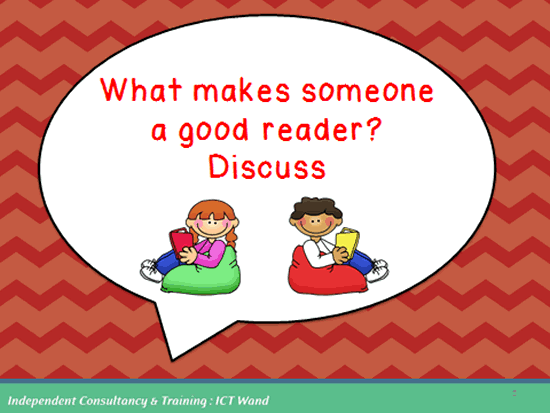
Researchers have compiled many lists of what 'good readers' do whilst reading, such as:
- The reader consciously intends to control the reading process (they are aware of their reading and want to pursue understanding).
- Classifying the purposes / goal of reading (they know why they are reading the text and what they will do with the information).
- Identifying the important aspects of a message (picking out key information, being able to identify the main concepts).
- Focusing attention on the major content, rather than the trivia.
- Monitoring ongoing activities to determine whether comprehension is occurring (e.g. do I need to re-read that last paragraph, I'm not sure I understand the word ... , does the author mean...).
- They consider a range of skills : re-reading, skimming, scanning, paraphrasing, predicting, identifying patterns in text, sequencing events, looking for relationships and use these appropriately.
- Engaging in self-questioning to determine whether goals are being achieved (Do I believe the author? Is my understanding of this now clear? How does what I have read fit with what I already know, I used to think... and now I think...).
- Taking corrective action when failures in comprehension are detected (e.g. reading forward to see if it makes more sense as the text progresses, re-reading, checking the meaning of a word in a dictionary, asking a friend).
2. We want to increase pupils' awareness and understanding of the thinking that takes place as they read.
Cognitive monitoring is required for effective reading - pupils need to be aware of their thinking and level of understanding as they read.
Cognition : intellectual functioning of the human mind characterised by remembering, comprehending, focusing, processing information, making decisions etc. Metacognition generally refers to the knowledge and awareness of this cognition.
For example, are pupils aware of when they encounter comprehension problems and do they adjust their strategies (e.g. slowing down their reading rate) as a result of this awareness?
Highly metacognitive pupils do, those that are less metacognitive don't.
- A study of 5-10 year olds showed that effective readers spend 27 seconds on easy paragraphs compared with 46 seconds on more difficult ones. They recognise that they are finding the text difficult and know that one strategy that can help is to read more slowly.
- Less effective readers did not show the same metacognitive processes and as a result spent the same amount of time on easy and difficult paragraphs, leading to reduced levels of comprehension.
This extends beyond young children, with research showing that adults who are effective readers are very aware of their cognition whilst reading.
3. We want pupils to have a tool kit of strategies they can use as they read
Awareness of, and developing skills in, reading strategies help pupils to become increasingly independent in comprehending texts. E.g. the strategies of: predicting, visualising, connecting, questioning, clarifying, evaluating. In addition, we want them to be skilled in taking notes, selecting key information, summarising and using evidence to prove a point. Pupils need to be explicitly taught these skills and be supported to use and evaluate the strategies they use when reading.
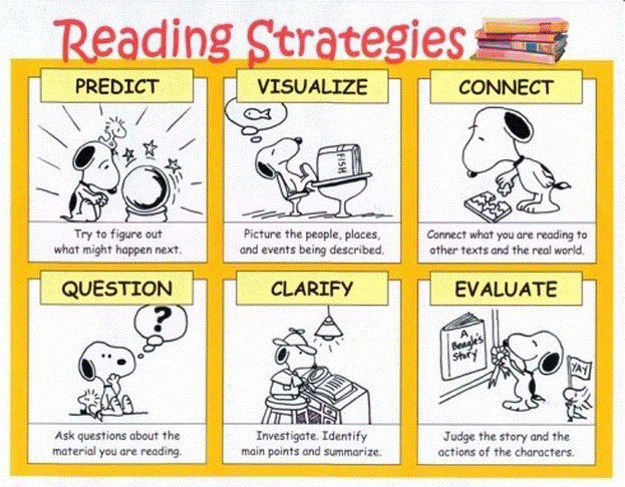
What was the last thing you read? A novel, a newspaper, a magazine, a shop window sign? If you considered the mental processes involved you would notice that thousands of thoughts were being processed in nanoseconds. You would realise that you read with reference to your sphere of ‘world knowledge and experiences’. This helps you to interpret what you read and act on it.
When we read we hardly notice the process, but our brains are busy:
- asking thousands of questions
- making links between what we read and our knowledge, experience and
- checking our comprehension.
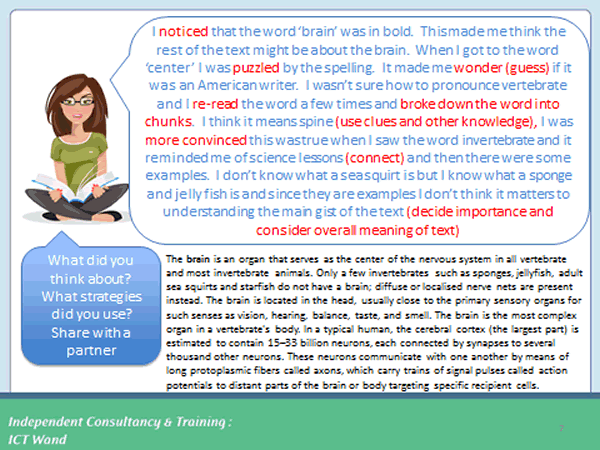
We usually only notice the process when we hit a bump in the road. We might notice that we have slowed down when we are struggling to understand the meaning of the text, or we might find we have to re-read a section because our mind has wandered, and despite reading the words, we have no recollection of the text. We can help pupils to have an increased awareness of what 'good readers do when they read'. This helps them to comprehend more complex texts and maximise their ability to learn from printed materials.
If you were reading a complex text about complex ideas, or an unfamiliar type of text, you might find yourself having to work a little harder to understand it. Perhaps you would read it more than once. Perhaps you would slow your rate of reading or read more deliberately. You might experience false starts, realise you don't fully understand and back track several words or sentences. You might glance back at the heading or fast forward to the last paragraph to help resolve your confusion. You would interpret points by using not only the text but your existing knowledge and understanding. You might stumble over unfamiliar words and find yourself using clues in the text and the context to clarify meaning. You might have found yourself having an internal conversation with the author or yourself, silently agreeing or disagreeing with what you are reading.
“As experienced readers read they begin to generate a mental representation, or gist, of the text, which serves as an evolving framework for understanding subsequent parts of the text. As they read further, they test this evolving meaning and monitor their understanding, paying attention to inconsistencies that arise. If they notice that they are losing the meaning as they read, they draw on a variety of strategies to re-adjust their understandings. They come to texts with purpose that guide their reading, taking a stance toward the text and responding to the ideas that take shape in the conversation between the text and self.” Reading for understanding, Schoenback, Greenleaf and Murphy 2012.
Some pupils will be very conscious of how they read and the strategies they employ, whilst others will not and may, in addition, have a limited understanding of how good readers engage with texts.
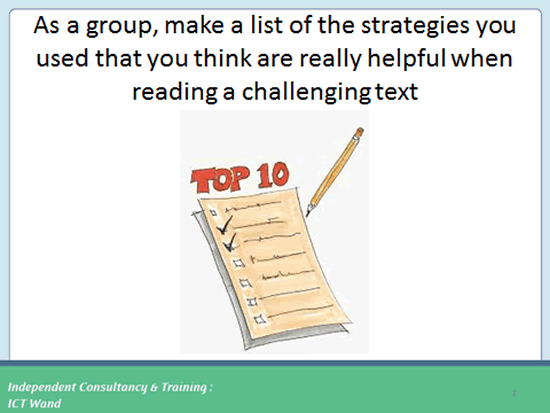
4. We want pupils to know how to overcome difficulties
At some point while they are reading, pupils will encounter comprehension or decoding difficulties. Rather than give up, we want pupils to know a range of strategies they can use to overcome problems. E.g. Read the paragraph again, slow down the reading rate, read on to see if the confused part becomes clearer with more information, break the information into chunks, clarify the meaning of a word by using a dictionary.
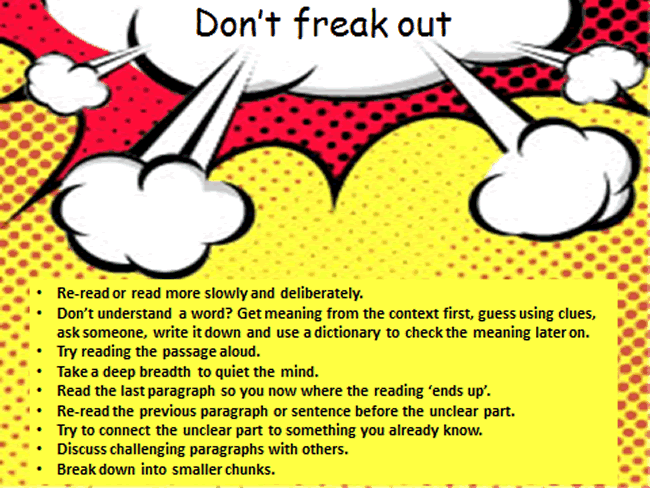
We can help pupils to learn that skills that can be used when they hit a road block in understanding, such as:
- Thinking about how new information relates to what you already know.
- Using contextual clues to help work out the meaning of unfamiliar words.
- Slowing down the reading rate for difficult sections.
- Re-reading when comprehension is not achieved.
- Reading through the text more than once - once for the general gist and a second time for more careful and thoughtful reading.
- Periodically stopping to paraphrase or summarise text.
- Engaging in self-questioning to check understanding and recall.
- Reading ahead to see if the part that currently does not make sense is any clearer when more is known about the overall text.
- Checking back at the title, subheadings, opening statement.
- Consulting an outside source, such as a dictionary, to establish meaning or reading an easier text on the same subject to give background before coming back to the more challenging piece.
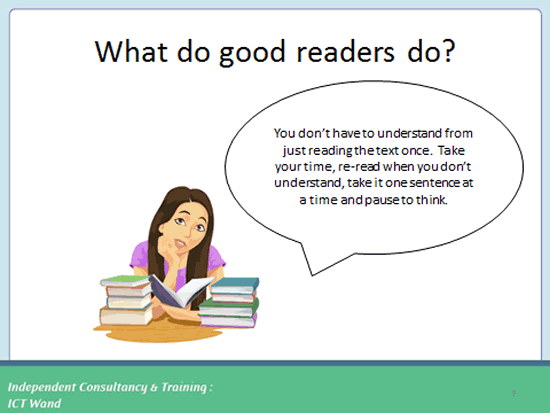
5. We need our teachers to understand the issues relating to reading and support pupils to develop the skills they need
Whether it is screen based or paper based, pupils need to be able to use a range of text based information sources for independent study. Many pupils see reading as merely decoding words on a page and fail to consider how they actually learn from text based sources.
It can be useful to help pupils develop a 'strategic reading plan' before they begin to read:
- help them to focus on the objectives of the reading - why are they reading and what will they need to do with the information.
- consider the strategies they might use to help them make sense of the text, e.g. through the teacher modelling useful strategies.
- helping them to consider what elements of the text might be challenging.
- reviewing strategies for getting 'unstuck' as they read.
We need pupils to be able to learn from different types of text. It is a hard process, but essential for life long learning and academic success. We must not shy away from this challenge, but learn how we can ensure pupils develop these skills. This can not be seen as the 'job of the English teacher'. It is the job of every teacher. How do you 'read like a scientist' or 'read with the eyes of an historian'? Pupils must learn to grapple with complex texts in every subject. Every teacher should model the process, provide opportunities for studying complex texts and guide pupils through the process.
We can help pupils by increasing their awareness of the metacognitive processes that take place during reading and explicitly teach them strategies that will help them to comprehend complex texts.
The major intention in metacognitive reading is to teach pupils the knowledge they need to read independently, which includes being able to PLAN, REGULATE, MONITOR and DEBUG as they read.

Could you answer this question? What would your pupils say?
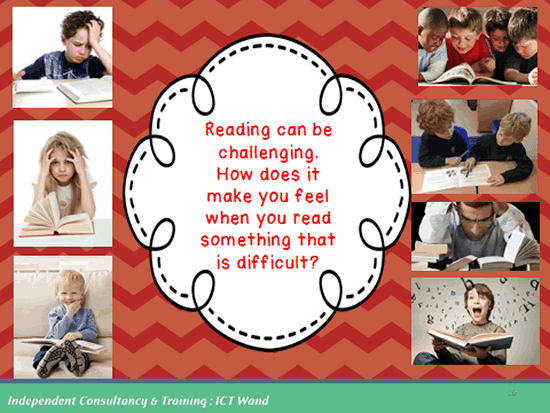
Pupils, at all ages, are on a reading skills continuum and need to become increasingly sophisticated in how they engage with texts, including developing the application of higher order thinking skills. Research studies covering secondary school phase, university students and adult readers all confirm the need to increase the reader’s ability to learn from complex texts. Some pupils need help to slow down and consider the meaning of the text, they may consider themselves to be ‘good readers’ as they can read quickly and accurately, but they may fail to fully comprehend the meaning of the text, miss nuances and fail to engage in any high order thinking. “Where pupils do not question their understanding they are often poor at judging accurately the level of their understanding. We have all come across pupils who believe that because they have read something they have understood it, and yet, on questioning the pupil their lack of comprehension and recall become very evident.” Ann L. Brown et al (1981)
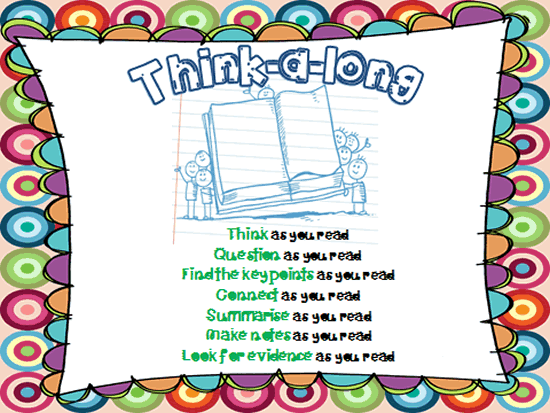
Only a very small number of pupils need specialist support in basic reading skills and decoding by the time they reach secondary school. Those who do should be receiving intensive intervention. Many pupils, will however, need help in expanding their vocabulary, particularly subject specific terminology and academic language (such as explain, argue, illustrate). All teachers need to take this into account when pupils are using texts in their subject.
Often struggling readers are asked to read less than other pupils. This impacts on their practise and fluency, and by fluency we mean their ability to read for understanding, with flow and accuracy. It can also lead to pupils having very little stamina or persistence when they encounter difficult texts. What we need is for them to learn the tools good readers employ and actually increase the amount of text they read.
The type of texts pupils need to use and how they interact with them are specific to subjects, e.g. a science text is different from a historical written source. Teachers should consider how they can help pupils to become expert readers in their subject. Explicit, discipline centred literacy instruction is very powerful. Who is better equipped to teach pupils how to read a scientific text and write scientifically than the science teacher?
Many teachers have felt frustrated by pupils inability to engage in texts. This has often lead to ‘teaching around the text’. To engage pupils in important ideas, teachers often find interesting and entertaining ways to deliver the information in the text, such as presentation, demonstration or activity. In this way, students remain dependent on someone to convey the curriculum content. If we want pupils to be independent we should not take away the requirement for pupils to regularly grapple with complex text and other sources. We must not ‘do their thinking for them’, somehow believing that it will be ‘quicker’ if we take on this heavy burden, as the price pupils pay in the long run is lack of progress. Perpetuating pupils’ dependence on teachers denies them the opportunities and successes they can only gain through extensive, independent reading.
We want to increase pupils' awareness and understanding of the thinking that takes place as they read.
We want them to have flexibility, adjusting their processing behaviours, such as reading rate, to effectively and efficiently meet the demands imposed by the purpose of reading and the characteristics of the text.
Metacognition starts with the reader consciously intending on controlling the act of reading. They have an awareness of metacognition and strategies that good readers engage in.
Often the metacognitive process starts with the reader clarifying the purpose of reading in their mind. That is, understanding the explicit and implicit task demands and establishing the goal. They use this to select strategies to help them understand the text and achieve the goal. For example, they recognise they may need to slow down when reading a challenging science article. They understand the demands of different types of text and different types of reading goal / purpose.
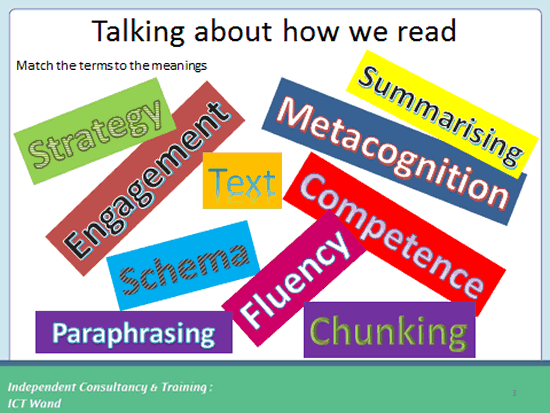
Like to share?
Why not send us your resources.